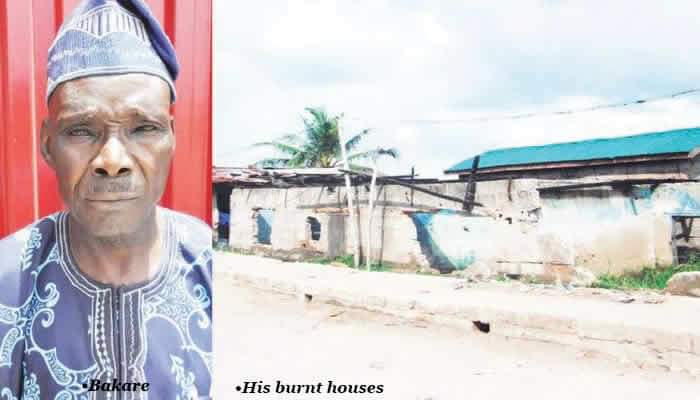
In this first of a two-part report, Afeez Hanafi writes about the frustrations property owners suffer at the hands of land-grabbers despite laws to curb their illegal acts in Lagos and Ogun states
At 74, many of Olu Bakare’s friends are already leading a restful life but peace of mind appears elusive to him. His heart sinks deeper into dejection each time he thinks of the dwindling chance to reclaim his property from suspected land grabbers.
Bakare bought a plot of land from Amos Brothers & Co in 1985 in the name of his father, Lasisi Bakare, and built two bungalows on it. Together with his family and parents, they all lived in the property happily.
The enduring excitement in the clan declined when Pa Bakare died in July 1992. But it didn’t take long for normalcy to return; the household resident on Ishola Street, Yaba, Lagos State, blossomed again – admirably.
Sometime 2014 while Bakare was in faraway Jos, Plateau State, the two buildings went up in flames. By the time the fire was put out, charred remains of his aged mother were trapped in the rubble.
The businessman mourned for months and when he was getting over the shock, a visit to the burnt property in May 2016 left him an emotional wreck.
“I learnt one Abule and his cohorts demolished the structures and sold the land to some persons,” Bakare said, his voice quivered with indignation. “My lawyer wrote to the National Human Rights Commission and sent a petition to the Lagos State Special Task Force Against Land Grabbers.”
The task force did not act on the petition until the intervention of a former Director of Citizens Rights in the Ministry of Justice, one Mrs. Ibirogba, Bakare said.
Relatives of Abule, who was nowhere to be found, were invited to a meeting with the task force and they promised to produce him in a week’s time. They reported back that they could not find him.
“The family did not come with the persons whom they claimed Abule sold the land to either,” Bakare told Saturday PUNCH.
After four meetings, they offered to give him another land at a nearby slum in Makoko which he said he rejected. “They asked for what to pay in damages and I requested N30m. They said they would hold a meeting and promised to get back to me but they never did.”
All along, the septuagenarian has been travelling over 100-kilometre distance from Ijebu, Ogun State, to submit petitions and hold meetings in Lagos.
Almost five years since he embarked on the gruelling journey, petitioning the Lagos House of Assembly and the Governor’s Office, Bakare could barely see light at the end of the tunnel.
Worryingly, new structures – a two-storey building and four lock-up shops – had sprung up on the land and they were let out.
“The case was eventually referred to the Ministry of Physical Planning,” the elderly man stated helplessly.
He added, “The ministry had marked the buildings since they were under construction. They told me in March 2020 to pay some fees before demolition can be carried out. I have been struggling to raise the money since then. I have written letters to different people seeking help without success.”
Pitiable as his plight is, countless individuals are entangled in the intricate web of land grabbing in Nigeria’s economic capital, despite property protection law enacted by the state government in 2016 to deter forceful and unlawful possession of land.
The law for instance prescribed 10 years’ imprisonment for “a person who commits the offence of forceful entry” on conviction. Sadly, it hasn’t caught up with Bakare’s oppressor, Abule, and his accomplices.
Land grabbers’ tactics
As their moniker in Yoruba implies, land grabbers – Ajagungbale – are purveyors of terror. They are armed men usually engaged by land-owning families (omo onile) to chase buyers away from parcels of land either before, during or after the land had been developed.
Investigation by Saturday PUNCH revealed that in most cases, the crisis began after a family sold land to an individual. Months or years later when the buyer would have thought he had secured a lifetime asset, aggrieved members of the selling family or an entirely different clan would emerge and lay claim to the same land.
After tense altercations back and forth, disgruntled parties may ask the buyer to make an additional payment, almost the amount he bought the land, or be sent away from the property violently through land grabbers.
At times, a warring family would claim to have obtained a court judgment, decades after the land had been sold and contract hoodlums to recover it. In what follows, a horde of thugs – sometimes in company with police escorts – armed with guns, cutlasses, among other weapons would visit horror on the buyers who would have been living in buildings erected on the disputed land. While claiming to be executing a judgment which the buyers might not be aware of, the assailants would sack them overnight, maiming or killing some in the process.
A widow’s passionate cry
Mrs Kehinde Agbetanmije is also in Bakare’s shoes. The 75-year-old widow is still at loss over the February 1 invasion of her late husband’s land adjoining the family’s residence on Adetayo Street, Ikotun-Idimu Road, Lagos.
Within24 hours, under the supervision of armed thugs, construction workers allegedly on the orders of one Idris Oluomo fenced the land and mounted a gate.
The woman noted that the portion was part of the two plots of land her late husband bought in 1997 from Madarinkan family.
Poor Agbetanminje cried uncontrollably, but the encroachers didn’t give a damn. Few days later after the task force intervened in the matter, they returned to the site to lay foundations in defiance of a directive that all the parties should keep off the land.
“When the incident happened, I took ill and was going to the hospital every day for treatment,” the woman had narrated tearfully in a video interview with The PUNCH. “I was traumatised. My children assured me that the matter will be settled but there is no headway yet.”
Although Idris denied involvement in the invasion, he maintained that a judgment had been obtained against the Madarikan family that sold the land to the Agbetanmijes.
He had said, “I cannot do such a thing as a prince. The land in question belongs to the family of Isheri Olofin and they got a judgement on it. It is a member of the family that is working there. They can’t use my name. Those people (Agbetanminjes) bought from judgment debtors. If they have any questions, they should go to court.”
Saturday PUNCH learnt that the judgment had been appealed and all the parties asked to maintain the status quo.
Overwhelming land issues
The state government enacted the Lagos Property and Protection Law on August 15, 2016 to tame the rising cases of illegalities perpetrated by land grabbers. Their conduct is believed to have hampered efforts to address the galloping housing deficit of about 2.5 million units in the state.
With an estimated population of over 23 million and an influx of about 86 people relocating to the state every hour according to the state government, solving the housing deficit has become a herculean task as more people chase limited real estate resulting in all kinds of fraudulent acts by land grabbers.
The Lagos State Property and Protection Law prohibits forceful entry and illegal occupation of landed properties. It prescribes severe penalties with various prison terms and fines for different offences and to facilitate its implementation, the Lagos State Special Task Force Against Land Grabbers was established.
Lawyer is a victim too
Adefolaju Oloko had thought his worries about the imminent loss of four and a half acres of land belonging to his family were over when the law became operational.
He was excited that his aggressors would desist from forceful attempts to claim the land his late father bequeathed to him and his siblings.
The lawyer would later realise one afternoon in September 2016 – barely one month after the law prohibiting forceful possession of properties was enacted – that his expectations were a mere illusion.
A suspected land grabber well known as Sir K and his ‘boys’ in company with an army lieutenant stormed the property in Igbe-Ogunro community, Ijede, Ikorodu area of Lagos. The lieutenant claimed to have bought part of the land from the Odubote family who had earlier sold the same property to Oloko’s late father.
Oloko narrated that the hoodlums demolished the fence shielding the property, destroyed a farm on the premises, took over a section of the land and started building on it.
“One of Sir K’s boys known as Alhaji White asked me to bring the document on the land, but I did not give him so that they won’t tamper with it. We have a bungalow and a farm on the land. They destroyed cassava and cucumber on the farm,” the lawyer told our correspondent in an earlier report in 2019.
“I wrote a petition to the Lagos State Special Task Force Against Land Grabbers and we were invited. The lieutenant said he bought the land in August 2016. The task force confirmed that there was an encroachment on the land but up till now, the matter has not been resolved.”
About two years after sharing his excruciating experience with our correspondent and over four years into the legal tussle, the possibility of reclaiming the land anytime soon largely remains a tall dream.
“We wrote a petition to the governor and Attorney-General. A meeting was scheduled and parties mentioned in the petition were invited,” the lawyer disclosed in a chat with our correspondent on Wednesday. “We also wrote a reminder to the governor after the meeting. Nothing has been heard of the matter till date,” he noted.
Avoiding land-grabbers’ antics, troubles
How can intending property owners stave off the headache of land grabbing? “Before buying land, you need to verify the genuineness of it,” an estate surveyor and valuer, Mr David Olamoju, advised. “Go to the land registry to confirm if that land is not under acquisition and if it is free from all encumbrances,” he further urged. “Then you go for land information which helps you to know the original land-owning families so that tomorrow someone will not come to tell you the land belongs to them after you must have bought it.”
Olamoju, a fellow of the Nigeria Institution of Estate Surveyors and Valuers, termed the process ‘legal search,’ noting that payment should be made only after the search confirmed the land’s genuineness.
“After buying the land, you go further by securing your interest on that land,” Olamoju counselled. “You need to register your title on the land.”
He described the major problem an average Nigerian encounters after buying land as failure to secure the land title to check unlawful takeover in the future.
“Even if they grab the land, the title will ensure that the law helps you in reclaiming it. People just buy land and put perimeter fencing. That is just a physical possession. People need to get their survey plan, CofO (Certificate of Occupancy) and governor’s consent,” he added.
With recourse to bureaucracies involved in proper acquisition of land, Chairman, Real Estate Developers Association of Nigeria, South-West zone, Mr Debo Adejana, urged potential land buyers to engage professionals.
“Lang-grabbing is a serious issue especially in Lagos and parts of Ogun State,” Adejana said. “The way some people go about acquiring property lives them open to such a possibility (land grabbing). Professionals should be engaged to do due diligence.”
The real estate agent also suggested a cashless mode of payment to formalise land transaction. That way, “the money can be traced” when any controversy arises. “People should make sure they tie the loose ends,” Adejana stressed.
An estate developer, Mr Sesan Obe, maintained that buying family land could be delicate particularly when ownership belongs to more than one family and also contentious.
Oftentimes, family land is beleaguered with court cases and unsuspecting buyers can walk into a trap unaware the land has been resolved in favour of a particular family.
“The families will frustrate you. At the end of the day, you will have to settle with them,” Obe said, “Before anyone buys land, it is good to do one’s checks well. Ask questions in the neighbourhood and make verifications from the government,” he advised.
Same sad tales in Ogun
Pa Yekini Mustapha was an established farmer growing yams, maize and kola nuts on an expanse of land in Iboro, Yewa, Ogun State. He had reportedly inherited the land from his mother and made good fortunes from bountiful harvest every season until early 2018 when some thugs allegedly working for a retired civil servant stormed his farm and destroyed crops.
The forceful entry – in gross violation of the Section 3 (1) and (2) of the state’s Prohibition of Forcible Occupation of Landed Properties Law 2016 – was premised on a July 2017 customary court judgment the civil servant and his cohorts claimed to have obtained on the land.
Section 3 (3) of the law “prescribes a 21-year prison term for a person convicted for violating the Sections (1) and (2) of the law,” but the retired civil servant appears “bigger than it,” said Nua Mustapha, one of the victim’s children.
The invasion and massive destruction of his farm took a toll on Mustapha’s health. He died on July 27, 2018 in the middle of a battle to regain his property.
Nua stated, “One man popularly called Major is claiming the ownership of the land. My father inherited it from my grandma and he was using it to farm. On the orders of Major, some thugs stormed the land, beat up my father and destroyed the crops on it. They claimed the land belongs to them and warned my father not to step on the farm again.
“We reported the incident at the police headquarters at Eleweran (Abeokuta). It was transferred to Zone 2 headquarters in Lagos on June 7, 2018 and the police arrested some of the thugs. But after three days, they freed them and told us to come back.
“When we went back, we were told that the policeman that would attend to us was not around. We went back twice but they did not attend to us. My father developed high blood pleasure in the course of the matter and died. Since my father died, I have not visited our home town for fear of being attacked.”
Oyewale, a 55-year-old landlord in Ibafo, a suburban community in Ogun, frustration masks the joy of building his own shelter after about two decades of tenancy in the neighbouring Lagos State.
Oyewale, a civil engineer, bought a half plot of land in 2014 through an agent called Alhaji Small and built a two-bedroom apartment on it.
In a desperate attempt to take over the remaining portion of the land from him, one Jide, a member of the land-owning family recently erected a tomb in front of the building.
“For over one year that we completed the building, we could not live there peacefully,” Oyewale said bitterly. “My wife, four children and I are afraid to live in the building but we have no option. He (Jide) erected the tomb in February and informed his elder brother called Sasamura.”
After he reported the case at the Ibafo Police Station, some policemen and someone engaged by the family visited the site to take a measurement.
It was concluded that the tomb is not encroaching on his land and that his house is backing the remaining portion. Unfortunately, he did not have a survey plan to prove them wrong.
“I bought a piece of land in 2014 through Alhaji Small and he gave me a receipt,” Oyewale said, recalling the hurdles he scaled through to build the house. “He resold the land and offered to give me another one. I declined and asked him to refund my money.”
He continued, “I didn’t like the spot he wanted to give me because it has a lot of trees but people advised me to take it on the grounds that I may not be able to get a refund. I struggled to raise some money and started developing the land. I built a two-bedroom flat and wanted to build a self-contained apartment close to it.
“About five years ago, Sasamura came and demolished the self-contained apartment which was at the lintel. He said his dad was buried there. Meanwhile, he and the agent didn’t tell me when I was buying the land.
“While we wanted to roof the two-bedroom flat, Jide came with Sasamura and collected N50,000 for roofing. Sasamura told me to pay N100,000 for a family receipt. I begged him before he collected N33,000. A day after I paid, Jide brought some people to erect the tomb.”
Barrage of cases, slow resolutions
There have been overwhelming cases of land grabbing reported to the authorities since the two states enacted their respective property protection law but only a few matters have been resolved while the menace continues unabated.
The Lagos State Government in June 2020 revealed that it had received 1,000 petitions relating to forceful takeover of landed property in the state through the Special Task Force Against Land Grabbers out of which 350, representing 35 per cent, were resolved.
Attorney General and Commissioner for Justice, Mr. Moyosore Onigbanjo, revealed the records at a press briefing held at Alausa, Ikeja, to commemorate Governor Babajide Sanwo-Olu’s first anniversary in office.
He however said efforts were being made by the government to strengthen the task force to arrest and prosecute suspected notorious land grabbers to send a strong signal that the Sanwo-Olu-led administration was determined to rid the state of illegal takeover of land.
Onigbanjo had said, “The task force with five counsel received 1,000 petitions out of which 350 have so far been resolved, while over 600 are pending and are at various stages of resolution.
“About 20 petitions are currently being prosecuted in court, 20 pieces of property under dispute were marked with inscriptions by the office to prevent any further transactions until pending issues are resolved.
“The arrest and prosecution of several suspected land grabbers were also effected in conjunction with security personnel attached to the Governor’s Monitoring Team.”
The state Commissioner for Information and Strategy, Mr Gbenga Omotoso, admitted that the task force was inundated with a deluge of complaints on landed properties, promising that the agency would do more in resolving issues associated with land grabbing.
He stated, “They are doing a lot even though they can do more and the government is encouraging them to do more. Lagos is growing every day. If some people are saying their complaints are not being attended to as fast as they think, they may be right but it is not as if the government is not doing anything.”
On his part, the Attorney General of Ogun State, Mr Akingbolahan Adeniran, said the task force had received several complaints on land matters.
He, however, did not disclose the number of cases received and resolved by the agency.
Adeniran said, “The task force though constituted has yet to be inaugurated. I am not a member of the task force but I am aware that it has received complaints and is working on several complaints. Once it is inaugurated, it will carry the public along on its activities.”
While addressing some protesters in September 2019, the state Chief of Staff, Alhaji Shuaib Salisu, said the anti-land grabbing law would be amended to properly tackle property-related crises.
The amendment is still ongoing according to the Attorney General. He added, “We have a draft Anti-Land Grabbing Bill (that has been reviewed by multiple stakeholders over the past year) to be presented to the Executive Council for approval to transmit to the House of Assembly. This should take place within a month.”
By Afeez Hanafi












